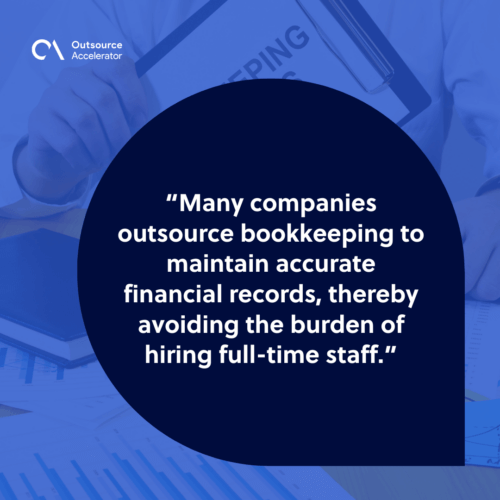Myth vs. reality: Uncovering 7 misconceptions about financial outsourcing

Financial outsourcing is gaining traction as a smart strategy for companies looking to cut costs and improve efficiency.
As per the Grand View Research, the global finance and accounting outsourcing market is projected to grow from $60.31 billion in 2023 to $110.74 billion by 2030. This will have a compound annual growth rate (CAGR) of 9.1%.
Yet despite this rapid growth, many businesses remain skeptical, held back by persistent myths and outdated beliefs.
In this article, we will debunk seven common myths about financial outsourcing, providing clarity to help businesses make informed decisions.
Financial outsourcing: Commonly outsourced services
Businesses across various industries are now relying on financial outsourcing to streamline operations and gain access to specialized expertise.
Shifting select financial tasks to external providers enables companies to focus more on growth while cutting down overhead costs.
Below we have the most commonly outsourced financial services:
Bookkeeping
Many companies outsource bookkeeping to maintain accurate financial records, thereby avoiding the burden of hiring full-time staff. This service typically includes:
- Managing ledgers
- Recording transactions
- Reconciling bank statements
- Tacking expenses
A dedicated provider can deliver reliable and timely data that supports better financial decision-making.

Accounts payable and receivable
Handling outgoing and incoming payments is time-consuming. Outsourcing accounts payable and receivable helps maintain healthy cash flow and reduces the risk of late payments or missed invoices.
Trusted third-party providers often implement automated systems to improve tracking and payment accuracy.
Payroll processing
Payroll demands accuracy, compliance, and timely delivery. Farming out this function minimizes risks related to tax errors or late submissions.
Outsourcing firms handle everything from employee compensation and benefits administration to tax withholdings and statutory reporting.
Financial reporting
Financial statements are crucial for internal reviews, audits, and communicating with stakeholders.
Outsourcing financial reporting enables businesses to gain detailed insights prepared by professionals who stay current with the latest regulatory standards and reporting formats.
Tax preparation and filing
Tax laws constantly change, and staying compliant requires expert knowledge. Many businesses outsource tax preparation to avoid costly errors, reduce risks during audits, and benefit from strategic tax planning.
Outsourcing these services creates room for growth while improving operational accuracy and compliance.
7 Misconceptions about financial outsourcing
Finance outsourcing continues to grow in popularity, yet there are still businesses that hesitate due to common misconceptions. These myths often prevent growing companies from taking advantage of cost savings, expert talent, and improved efficiency.
Now, let’s dive into the seven most widespread myths and the truth behind each one:
Myth #1: Only large corporations outsource
The truth: Many believe finance outsourcing is only for big companies. In reality, small and mid-sized businesses benefit just as much, if not more, because outsourcing helps them access top-tier services without hiring in-house teams.
Myth #2: Outsourcing leads to job loss
The truth: Outsourcing doesn’t always mean cutting jobs. Instead, it allows internal teams to shift focus to higher-value tasks while routine functions go to external specialists.
This can actually boost job satisfaction and productivity.
Myth #3: Outsourcing means losing control
The truth: Some business decision-makers think outsourcing financial tasks means giving up control. The opposite is often true.
With the right partner, companies gain better oversight, more consistent reporting, and access to real-time data dashboards.
Myth #4: Data isn’t safe with outsourcing providers
The truth: Security remains a top concern. However, most professional outsourcing firms invest heavily in advanced cybersecurity systems and adhere to strict compliance standards.
Choosing a reputable provider minimizes risk and often strengthens data protection.
Myth #5: Financial outsourcing is too expensive
The truth: While outsourcing comes with a cost, it often proves more affordable than maintaining full-time staff, software, and infrastructure. Many companies discover long-term savings after switching to outsourced models.
Myth #6: Time zones and language barriers cause problems
The truth: Modern finance outsourcing firms often operate across multiple regions and offer dedicated teams that are fluent in English and familiar with local regulations.
Time zone differences rarely impact the quality of service, especially when proper coordination is in place.
Myth #7: Outsourcing uses a one-size-fits-all approach
The truth: Another common myth is that outsourcing providers use the same solution for every client. In reality, top firms customize their services to match each company’s goals, processes, and industry-specific needs.
Knowing the truth behind these misconceptions enables companies to make more informed decisions about finance outsourcing and unlock their full potential.

Stop drowning in receipts: Financial outsourcing can boost your profits
Free up your time and resources by handing off tedious financial tasks to trusted experts. Note that the right outsourcing partner helps you to:
- Reduce overhead costs
- Improve accuracy
- Gain deeper financial insights
Instead of sorting receipts and juggling spreadsheets, focus on growing your business and reaching your goals faster.
Finance outsourcing isn’t just about convenience—it’s a smart move that supports long-term profitability. Take control of your finances with a strategy that drives efficiency, clarity, and sustainable success.







 Independent
Independent




